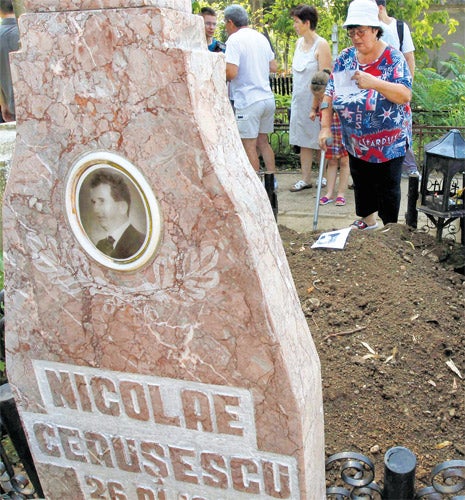Bodies exhumed to solve mystery of Romanian tyrant's burial

The mystery of where former Romanian dictator Nicolae Ceausescu and his wife Elena were buried has moved a step closer to being solved after forensic scientists dug up their official graves yesterday in a hunt for DNA.
Ceausescu ruled Romania for 25 years with an iron fist before being ousted and executed on Christmas Day 1989 during the anti-communist revolt in which more than 1,000 people were killed.
Many Romanians have doubted for years that the Ceausescus were really buried in the Ghencea military cemetery in west Bucharest. Still, they were shocked by the unannounced early-morning exhumation, part of a five-year lawsuit.
"I never thought this would happen," said Ioan Mirichi, 81, who was visiting a relative's grave: "I didn't believe the rumours [Ceausescu] wasn't buried here... but I suppose the family must decide."
Conspiracy theories range from the graves being empty to the Ceausescus' corpses being spirited off by supporters and replaced in their coffins by anonymous victims of Europe's bloodiest anti-communist revolt.
By the end of the day, one theory had been ruled out. "There weren't empty graves, there were bodies," said Valentin Ceausescu, the couple's 62-year-old son. "We are not looking for revenge. We just want the truth."
As news of the exhumation broke, officials rapidly sealed off the cemetery. In a process that took two hours, a team of pathologists and cemetery officials hoisted the wooden caskets of Ceausescu and his wife out of their graves, took DNA samples from the corpses, then reburied the coffins.
Mircea Oprean, the husband of the couple's late daughter, Zoia, was present at the exhumation. He said a belt and thick gray fur hat worn by Ceausescu meant it was "likely" the couple were buried in those graves. Ceausescu's alleged remains were better preserved than those of his wife, he commented.
Zoia had sued the defence ministry in 2005, saying she had doubts that her parents were in the cemetery. She died of cancer in 2006 and Valentin took up the case. The couple's other son Nicu died of cirrhosis in 1996 and is buried in the same Ghencea cemetery. Valentin insisted he was not interested in unravelling the secrets of the revolution but only in determining if his parents' bodies were indeed buried there, so he could conduct a private burial in adjoining graves. It will take several months to determine the identity of the remains.
Romanians rose up in 1989 as other Communist regimes collapsed in Eastern Europe, a people angry and exhausted by years of draconian rationing as Ceausescu tried to pay off the country's foreign debt. Meat, cooking oil and butter had been severely limited and blackouts were common. Ceausescu was also known for the ruthless way in which he stifled dissent. His Securitate secret police were believed to have 700,000 informers in the Balkan nation of 22 million. He was toppled on 22 December 1989. He tried to flee Bucharest by helicopter but his pilot switched sides. After a summary trial, Ceausescu and his wife were executed by a firing squad three days later.
Aurelia Fuica, tending marigolds at a family grave just yards from where the exhumations were taking place, described how her family had suffered under Ceausescu. "My in-laws were thrown out of their homes like dogs and their properties were sold. My husband was a political prisoner," she said. But she had no disagreement with yesterday's exhumation: "There is a mystery that needs to be solved."
Shallow graves
* South American independence hero Simone Bolivar was exhumed last week by Venezuelan president Hugo Chavez, both to glorify his hero and to search for evidence for his theory that Bolivar was murdered. "It is not a skeleton!" he said, before displaying the remains on live TV. "It's the great Bolivar, who has returned!"
* Georgia's first president has now been dug up three times. Zviad Gamsakhurdia was ousted in a coup, and after his death secretly disinterred and taken to Chechnya. He was returned home in 2007, but earlier this year his wife dug him up again to protest at the detention of her son for espionage.
* After years of campaigning by the families of those thought buried with him, the grave said to be that of the Spanish poet Federico Garcia Lorca was dug up last year. The hope was to pinpoint those killed by Franco's supporters at the outbreak of the Spanish Civil War. But a two-month excavation yielded nothing, and Lorca's whereabouts remain a mystery.
Subscribe to Independent Premium to bookmark this article
Want to bookmark your favourite articles and stories to read or reference later? Start your Independent Premium subscription today.

Join our commenting forum
Join thought-provoking conversations, follow other Independent readers and see their replies